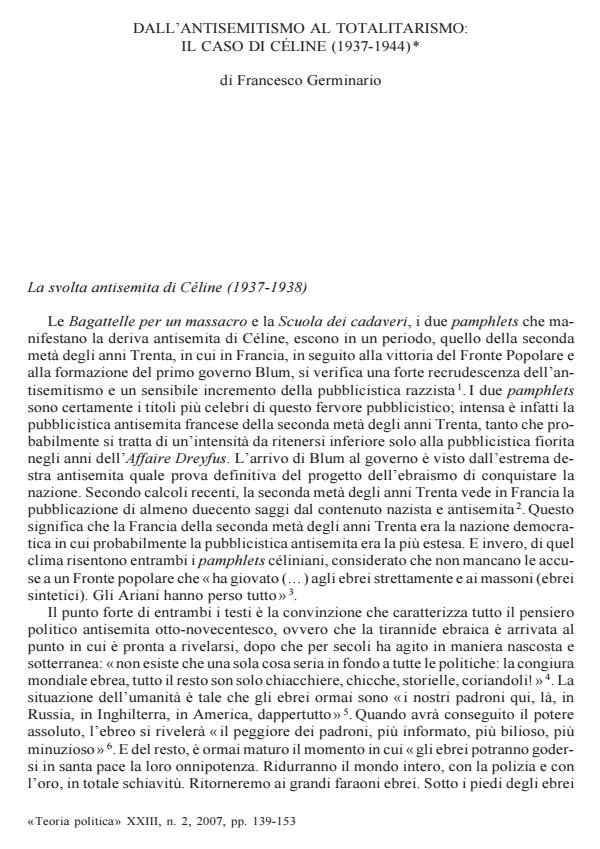Dall'antisemitismo al totalitarismo: il caso di Céline (1937-1944)
Titolo Rivista TEORIA POLITICA
Autori/Curatori Francesco Germinario
Anno di pubblicazione 2007 Fascicolo 2007/2 Lingua Italiano
Numero pagine 15 P. 139-153 Dimensione file 332 KB
DOI
Il DOI è il codice a barre della proprietà intellettuale: per saperne di più
clicca qui
Qui sotto puoi vedere in anteprima la prima pagina di questo articolo.
Se questo articolo ti interessa, lo puoi acquistare (e scaricare in formato pdf) seguendo le facili indicazioni per acquistare il download credit. Acquista Download Credits per scaricare questo Articolo in formato PDF

FrancoAngeli è membro della Publishers International Linking Association, Inc (PILA)associazione indipendente e non profit per facilitare (attraverso i servizi tecnologici implementati da CrossRef.org) l’accesso degli studiosi ai contenuti digitali nelle pubblicazioni professionali e scientifiche
The political essays by Céline issued between 1937 and 1938 can be classified in a hypothetical gallery of « classic» belonging to the Nineteenth century political Anti-Semite thought. In these pages, in fact, several Anti-Semite and racialist stereotypes are shown as a demonstration of a very good Célinian knowledge of the previous Anti-Semite literature and issues. But their real importance also comes from the fact that the French writer reveals a clear adhesion to the Anti-Semite image of history. On the other hand the Célinian analysis identifies the Modern Age as the Age of Verjudung starting from the idea that Hebraism has dominated unopposed until that moment because the Arian peoples have become Jewish in their behaviour and tradition. Céline foresees, moreover, several themes of the following period defined as Collaboration. The Célinian critics against Germanofobia of the extreme French leftwing is ferocious. In particular against its most representative thinker, Maurras, in the name of an alliance among Arian peoples in order to overturn the historical process started in 1789. These points of view will be emphasized even in the years of Vichy dictatorship when Céline understands all the totalitarian implications of the Anti-Semitism as a strategy which lays down the basis of «new man », i.e. of in the Blut « de- Jewished man », above all « de-Jewished » in his Kultur. In these years, in fact, Céline ask not only for a more intense Anti-Semite Vichy politics, in his opinion too moderate, but also for the birth of a government based on the supremacy of the totalitarian party following the example of Nazism and Fascism.;
Francesco Germinario, Dall'antisemitismo al totalitarismo: il caso di Céline (1937-1944) in "TEORIA POLITICA" 2/2007, pp 139-153, DOI: